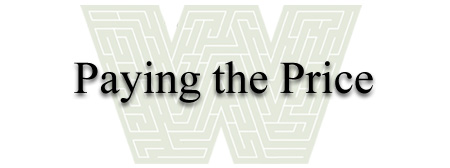
Looking to the Future
Royalties and Patent Licenses
Some universities benefit from royalties and license fees for patents held by the institution. The Wisconsin Alumni Research Foundation's patents on Vitamin D technology and warfarin has been a cash cow for the dairy state-since 1925 more than $620 million in royalties has gone to University of Wisconsin research. At the University of Washington, Professor Ben Hall's work on yeast genetics led to a manufacturing process for the hepatitis B vaccine. Since FDA approval in 1986, the UW has received $35 million in royalties from the Washington Research Foundation for this technology.
Could this be a place where the UW can fill in the holes left by declining state support? "While we continue to do well in this field, it is highly unpredictable and highly unreliable," warns Patterson. "Depending on royalties would be a lousy way to finance an institution," adds Huntsman.
Auxiliary Enterprises
A final category includes auxiliary enterprises such as athletics or the UW Medical Center. Alumni sometimes ask why income from TV broadcasts, trademarks licenses or patients fees can't go back to the central budget.
The University does expect self-supporting units to pay for heat, lights, insurance, maintenance and other overhead charges. But beyond that cost, UW policy lets these units retain the rest of the income. Adding some kind of fee could cripple programs that now stand on their own. For example, the University has one of the few NCAA Division I athletic programs in the nation that is not subsidized by the state or through student fees.
Looking over the list, Patterson says there is not one "magic silver bullet" that will slay the budget monster. But he says he is still optimistic. "We still have good, creative faculty here, entrepreneurial people who can solve this problem."
At the same time, could the entrepreneurial model distort the mission of the university? At a regent's planning session last year, Regent Connie Proctor worried out loud about getting lost in the maze: "We could come to the point where private funds are directing the University. We may be pulled to certain areas because that is where the money is-not necessarily where the need is," she said.
The UW will resist overemphasis on the marketplace, the President says. "There are no world-class universities without strength in classics as well as chemistry, in comparative literature as well as computer science, in musical theory as well as molecular biology. Whatever the marketplace may say, we must ensure the excellence of the humanities and the arts," he responds.
"All these directions may be necessary directions, but they may not be as desirable as state funding," says Holt. "If you could get the state to go along with increased funding as well, what a great place this would be."
These alternatives in no way let the Legislature off the hook, say UW leaders. "We will continue to make our case to the state that the UW is an indispensable public asset, which needs, and can abundantly justify, significant public support. We will point to our role as an engine of the knowledge-based economy, as a gate of opportunity, as a source of medical benefits for the whole state," says President McCormick.
"We cannot slacken our efforts to educate the public and the Legislature," Huntsman adds. "At the same time, we can't count on success. The quality and impact of this institution are too much at risk." —Tom Griffin is editor of Columns
- Return to Page 1
- Sidebar: Ups & Downs: Futures in UW Funding
- Return to September 2002 Table of Contents